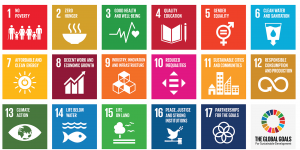The United Nations’ Sustainable Development Goals

In 2015 the United Nations established 17 Sustainable Development Goals (SDGs) to address the major social, economic, and environmental issues around the world. Each universal goal is equally important as they are interconnected, and transformative progress is required in all goals to develop a sustainable world. These goals are attempting to be achieved globally by 2030 and as such are becoming more prominently addressed.
The United Nations defines sustainability as “meeting the needs of the present without compromising the ability of future generations to meet their own needs.” It highlights the necessity for better practices now to ensure a prosperous future while maintaining quality living conditions of the present.
‘We The People’ for The Global Goals | Global Goals
In 2019, The UN Secretary-General called for all societal actors to mobilize for a Decade of Action in order to accelerate sustainable solutions to the world’s biggest challenges on three distinct levels:
- Global Action – to secure greater leadership, more resources, and smarter solutions for the SDGs
- Local Action – creating the necessary policies, budgets, and frameworks within governments and cities
- People Action – people taking action (youth, civil society, media, unions, academia, etc.) to push for transformational changes towards the SDGs
The Decade of Action is meant to mobilize everyone, everywhere, demand urgency and ambition, and supercharge ideas to solutions focused on the SDGs. For more information visit: un.org/sustainabledevelopment/decade-of-action/. Many organizations and institutions, such as Brock University, recognize this definition and uses it in the sustainability policies that guide their organizations. Explore Brock University’s Sustainability Policy.

